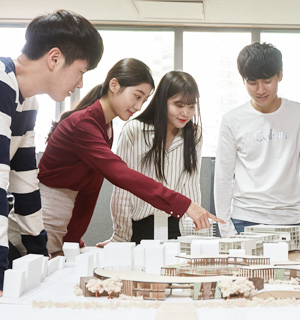
Architecture is a composite art that is based on humanities, social sciences and natural sciences and also a unique academic discipline that plays an important role setting the paradigm of living spaces appropriate for our rapidly changing society and developing future-oriented urban spaces that best utilize the environment and advanced technologies. To produce creative architectural specialists that our highly-modernized and informatized 21st century demands of, the Department of Architecture offers a 5-year program that meets international standards and invests all of its energy into providing the best educational and research environment.
Location : Rm.415, Hwado Hall
Tel : 82-2-940-5191
Fax : 82-2-940-5191
e-mail : kuda@kw.ac.kr
Website : https://www.kwuarchitecture.com/
Course Descriptions
Digital Presentation
The purpose of this lecture is to study Digital Presentation techniques and its applications within the field of architecture, and make practical use of this fundamental knowledge using graphic programs.
Structural System 1
This course covers construction materials and weight of buildings, classification and characteristics of the structural system, dynamic features and movements of main materials and also introduces simple design methods.
Building Construction(Construction major)
This course is designed to introduce basic structure of building construction. It provides a general understanding on the basic process of construction and the physical elements and environment of buildings.
Course Descriptions(Sophomore year-1st semester)
Building Construction This course is designed to understand buildings from a physical point of view, in order to design and construct based on such knowledge. Also, this course studies the process of how people's needs are developed into physical parts of an actual building.
Building Environmental Technology 1
Building Environmental Technology deals with building performance which must be considered during the architectural design process. Spacial, thermal, visual, acoustical and indoor air quality are the constituents of building performance, which also depends largely upon the knowledge and experience of the architect, who aims to integrate these constituents within the design process. Basic design principles and evaluation techniques will be discussed related to daylighting, ventilation, solar energy utilization and etc.
Building Environmental Technology Ⅱ
As the demand for art galleries, museums and concert halls, opera houses increase, architects are required to understand the basic concepts and application methods of natural lighting, indoor lighting and acoustical design techniques in designing such types of buildings. Thus, fundamental theories and design techniques of natural lighting, indoor lighting and acoustics will be introduced in this course.
Area Planning(3/3)
This course will examine planning, designing and engineering tasks in order to execute development of various types of areas, including housing areas. Special focus will be made on the study of area planning theory and execution guidelines, as well as the development of practical planning and designing skills, which are to be trained by providing planning & designing exercises based on actual areas.
Building Service System I
Building environmental control is one of the major functions that a building must provide. The building service systems are important in modern buildings, because they provide services which are highly required for the comfort and work efficiency of residents. This course will introduce the basic principles and HVAC process of building service systems, as well as high-tech building systems.
Sustainable Architecture
The focus of this course is the application of ecological principles to architecture. The term "ecological architecture" is used to express the same meaning as many other terms, including green, sustainable, ecological, environment friendly, environmentally sound. The main topics of the course are as follows; energy conservation, material conservation, life cycle design and human design.
Indeterminate Structure Analysis
This course conducts analysis of deformations in statically determinate structures, beams for flexure, shear, and deflections, and energy theorems and their application. We will also study the principles and usage methods of slope deflection method, moment distribution method and matrix analysis method.
Environmental Control System of Architecture
The object of this course is to provide students with an understanding of environmental control system in architecture. There are several subareas of control system within architectural environment. They include climate, energy, thermal comfort, indoor air quality, lighting and acoustics. This course especially addresses passive control systems, including energy conservation and sustainable architecture.
Building Service System 2
Intelligent Buildings have become an issue in architecture as high-technology influences the modern society. The Building Automation System is becoming popular, as one function of the Intelligent Building, due to its potential for efficient operation and management of buildings. Basic concepts, system configuration, and issues for integrating various functions to improve building performance will be discussed, as well as the future directions of building environmental control systems. Construction Contracting) This course deals with the understanding of the construction process, responsibilities and duties of the construction parties, operation assignment among the parties, contracts according to division of labor and contract documents.
Advanced Structural Design
Fundamental principles of prestressing, prestressing materials and prestress losses are covered. In addition, this course will also examine various special methods of modern structural engineering, as well as features of mulit structures, dynamic theory and design, and the unlimited possibilities of various building formations through system application methods.
Environmental Design of Architecture
This course focuses on how people perceive the urban environment, how buildings fit contextually into the existing circumstances and how outdoor spaces relate to building structures. The objective of this course is for students to develop an in-depth understanding of design synthesis, including the environmental control system.
Basic Design 1
This course covers the first steps of architectural design, including concepts and methods of design.
Basic Design 2
Although one of the basic courses in architectural design, this subject includes the basics as well as the application stage.
Design Practice
This course focuses on the study and practical exercise of interior design.
Architectural Form
This course deals with architectural proportion, balance and beauty through various forms.